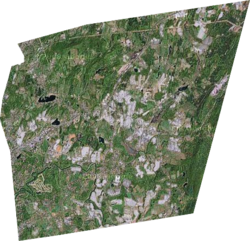Brunswick, New York
Brunswick is a town in Rensselaer County, New York, United States that was first settled in the early 1700s. During its history, it had been part of Albany County, Rensselaerswyck, and Troy, before its incorporation in 1807. It is bordered on the west by the city of Troy; on the north by Schaghticoke and Pittstown; on the east by Grafton; and on the south by Poestenkill and North Greenbush. The number of people living there was 12,581 at the 2020 census. The story of the town's name is fought: some say it comes from the source of its first people who lived in Germany, Brunswick-Lüneburg, while others say that it honors the "Duke of Brunswick (George I).
The town was in the past agricultural, but began experiencing suburban sprawl in the later decades of the 20th century, which continues today. Historically, most of the developments have happened around the town's two major crowded roads: New York Route 7 and New York Route 2, known locally as Hoosick Road and Brunswick Road. Brunswick became a popular place to settle in upon the completion of the local highway system in the Capital District, mostly the fix of Route 7 into a four-lane highway in the 1980s.
Landmarks
The town has two listings on the National Register of Historic Places, both schoolhouses: Garfield School and the Little Red Schoolhouse. And, it is home to a well-known cemetery, Forest Park Cemetery, right now under the power of the town. It is known by urban legend as being one of the most haunted cemeteries in the United States. A very small part of the historic Oakwood Cemetery, added to the National Register of Historic Places in 1984, and burial place of Samuel Wilson, a possible namesake of Uncle Sam, remains within the northwestern part of the town.
Brunswick, New York Media
Joseph H. Allen house in 1880, which still stands today
Satellite photo of Brunswick
Brunswick Town Hall




